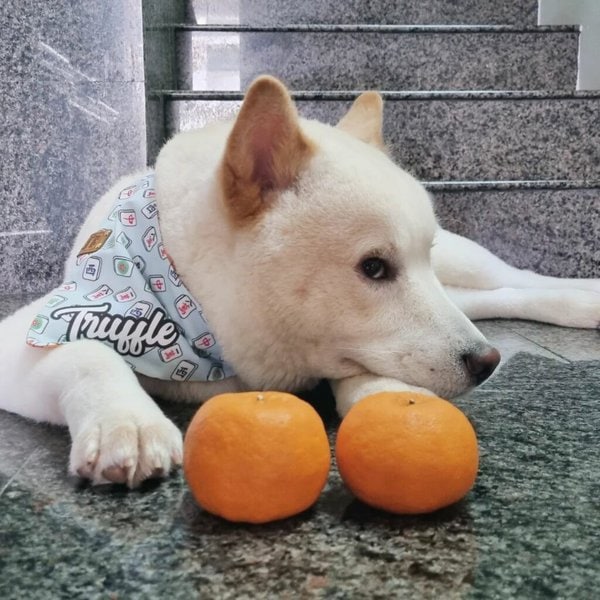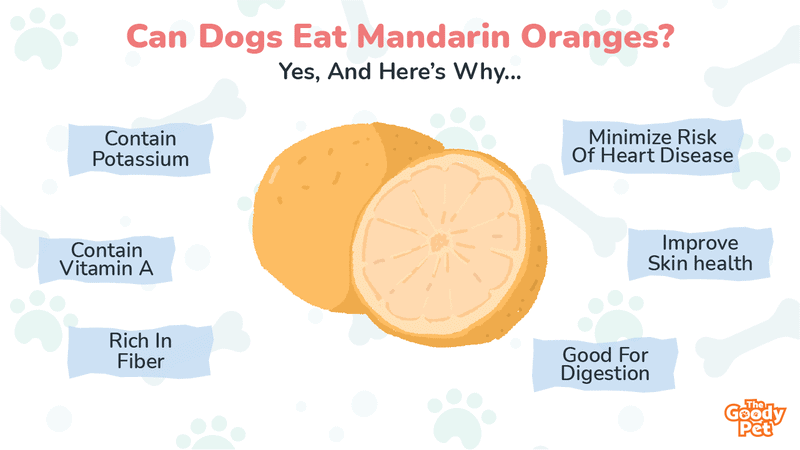Mandarin oranges are easily among the most popular citrus fruit varieties out there. This comes as no surprise considering how much they have to offer in terms of health benefits, not to mention how fun it is to peel them open and pick them apart.
Mandarin oranges are safe for dogs to eat. The same applies to the Cuties variation of mandarins as well. However, overconsumption of mandarin oranges and their Cuties variation will be a threat to dogs, leading to stomach upsets and diarrhea. The risks of health complications, like obesity, should increase in the long run if overconsumption continues.
As with any other food you may want to give your dog, moderation is crucial when it comes to feeding your dog mandarin oranges. To help you out, we shall take a closer look at why mandarin oranges have a lot to offer your dog’s diet as well as how to safely serve up the treat to your doggy.
Can Dogs Eat Mandarin Oranges?

Dogs can safely eat mandarin oranges, as is the case with most other citrus fruits. The best part is that it is not just a tasty and refreshing treat for the dog. This is because mandarin oranges are actually quite rich in nutrients.
Let’s take a look at some of these nutrients in mandarin oranges and their health implications when included in a dog’s diet.
Vitamin A
Mandarin oranges have a high amount of vitamin A which has numerous health benefits for dogs. These include improved skin and bone health, better vision, as well as strengthening the dogs’ immune system.
Vitamin B3 And B6
Mandarin oranges are also a great source of many of the vitamin B varieties. However, B3 and B6 stand out the most in terms of quantity in a single serving of mandarin oranges.
Vitamin B3 is particularly useful for older dogs or overweight dogs as it helps reduce the levels of unhealthy cholesterol and fatty acids in the pooch’s blood.
On the other hand, vitamin B6 plays a crucial role in several body functions and processes in dogs, from cellular regeneration to the production of energy.
Vitamin C
Vitamin C is arguably the most abundant micronutrient in mandarin oranges as well as other citrus fruits.
This is yet another multifunctional vitamin your dog gets to benefit from after consuming mandarin oranges.
Perhaps the most important health perks associated with the rich vitamin C content in mandarins are improved coat health and a boost in the dogs’ immunity.
Potassium
Potassium has numerous functions in a dog’s body, including nerve conduction and muscle contraction. The potassium also helps minimize the dog’s risk of developing health issues like diabetes and heart disease later on in life.
Fiber
Mandarins are also rich in fiber, which comes in very handy to promote a dog’s digestion and gut motility.
The high fiber content also makes mandarin oranges filling for dogs, making them perfect healthy treats.
Are Cuties Mandarins Safe For Dogs?

Cuties mandarins are not toxic to dogs. Technically speaking, cuties are just a brand name given to regular mandarins distributed by a company that shares their adorable name.
As long as the cuties are ripe, peeled, and washed, you should be able to safely allow your dog to enjoy some of the tasty fruit.
Is Mandarin Peel Toxic To Dogs?
A Mandarin peel is not going to poison dogs. However, there is the possibility that the peel might trigger gastrointestinal irritation if consumed, especially in big amounts.
This will manifest in a number of ways, with diarrhea and vomiting being the most common symptoms of irritation in dogs.
Furthermore, dogs may suffer from an obstruction in their digestive tract if they eat mandarin peels. This is because the peel is quite difficult for the dog to digest.






